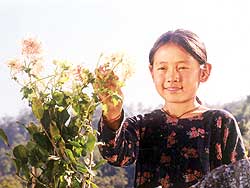 Numa bids a poignant farewell to her younger sister telling her repeatedly that she loves her parents very much, that she will be fine and pleading with her to look after her grandmother. And that's how the movie Numafung closes. The audience is a bit bewildered, even a little annoyed, not to be handed a neatly tied conclusion to the director Nabin Subba's tale of a Limbu girl named 'beautiful flower' (Numafung) in Lepcha.
Numa bids a poignant farewell to her younger sister telling her repeatedly that she loves her parents very much, that she will be fine and pleading with her to look after her grandmother. And that's how the movie Numafung closes. The audience is a bit bewildered, even a little annoyed, not to be handed a neatly tied conclusion to the director Nabin Subba's tale of a Limbu girl named 'beautiful flower' (Numafung) in Lepcha. Nepali films have always lacked originality, being, at best, poor copies of Bollywood. It was different with Nabin's film. It reminds many Nepalis of their own childhood days in their mountain villages where they climbed trees, chased goats and chickens. Numa's regal grandmother, mother, her mothers-in-law, her grandmother and the male characters in the film are recognisable in our own relatives.
Numa represents today's Nepali woman-torn between duty and self, the desire to achieve many things that her spirit desires but shackled by the rituals and norms of society. Ironically, the more 'sophisticated' the society, the more modern Nepali woman is shackled to the notion of upholding family name and honour.
Since that first time in March 2002, I've watched Numafung 11 times and even had the good fortune to travel with the film to Sikkim, Lepcha land. Numa herself ultimately takes the path less travelled, even though it may be tougher than putting up with the idiosyncrasies of a husband who is insensitive to her needs as a woman-both emotionally and physically. But isn't this what many Nepali women put up with today? Very often, efficient, independent career woman go home to insensitive husbands like Girihang who are all noise and bluster to disguise their inadequacies.
Nabin Subba has presented Numa's relationship with her two husbands with sensitivity and understanding. The innocent fun and friendship that could have matured into a deep abiding marriage filled with love and caring is cut short. As Numa throws a handful of earth on her husband's grave, many in the audiences I have watched it with have wept. Girihang, her second husband, treats Numa like a commodity, there only to fulfill his physical needs while she cries herself to sleep. The sensitive handling of emotional scenes of marital disharmony are all the more remarkable because the director himself is a bachelor.
All through Numa's life, her younger sister Lojina observes and sometimes quietly rebels. Only at the very end do we see a hint to her future: in a symbolic gesture she picks a wild flower, as if to tell us the audience, that she has taken on Numa's mantle of responsibility. It's a powerful way of demonstrating that traditional roles of women have still not changed in Nepal.
In Numafung, the mothers are mere spectators. They seem to understand Numa's needs and fears and but are unable to impact changes like the men. But don't we, modern liberated women, face the same dilemma? Even today, despite attempts at decision-making few women sit at the head of policy issue dialogues, political meetings, institutions and especially government. Where are the women with power?
The women of Nepal seem to have moved, but have we really? We are like Numa-full of dreams and aspirations, seeking our path to fulfillment. We have come full circle into a space that was ours, but is it really ours? Like Nabin Subba, through the medium of Numafung, this when we ask ourselves what we want and act upon it.
Renchin Yonjan is a Kathmandu-based social architect and movie buff.


